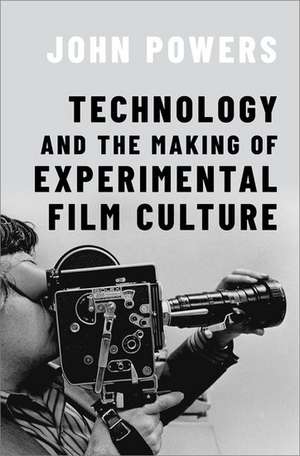Technology and the Making of Experimental Film Culture
Autor John Powersen Limba Engleză Paperback – 7 sep 2023
Preț: 200.61 lei
Nou
Puncte Express: 301
Preț estimativ în valută:
38.39€ • 40.18$ • 31.95£
38.39€ • 40.18$ • 31.95£
Carte disponibilă
Livrare economică 10-24 martie
Livrare express 22-28 februarie pentru 27.24 lei
Preluare comenzi: 021 569.72.76
Specificații
ISBN-13: 9780197683392
ISBN-10: 0197683398
Pagini: 280
Ilustrații: 26 color plates + 25 b&w halftones
Dimensiuni: 157 x 236 x 18 mm
Greutate: 0.45 kg
Editura: Oxford University Press
Colecția OUP USA
Locul publicării:New York, United States
ISBN-10: 0197683398
Pagini: 280
Ilustrații: 26 color plates + 25 b&w halftones
Dimensiuni: 157 x 236 x 18 mm
Greutate: 0.45 kg
Editura: Oxford University Press
Colecția OUP USA
Locul publicării:New York, United States
Recenzii
In this book's four brilliantly designed chapters, Powers grounds postwar avant-garde film in key technologies....the technological elements of familiar experimental filmmakers....developed more deliberately than they have been in critical texts like Visionary Film, and Powers also introduces numerous less recognizable filmmakers and films. The archival scholarship is outstanding, as the critical contexts build 'film culture' out of author interviews, artist notebooks and statements, and different kinds of small-press, academic, and mainstream film and photography magazines. The book includes a generous selection of color plates, helpful extended definitions of each new technology, reproductions of photography ads, movie frames, and lab receipts, plus some fascinating details in extended footnotes. A major contribution to the study of North American experimental cinema.
Dr. John Powers examines how the avant-garde embraced these material resources and invested them with meanings and values adjacent to those of semiprofessional film culture.
John Powers' thoroughly-researched, carefully-structured new book has created an expanded context for the immense flowering of a cine-world I thought I knew--drawing me to new understandings, to filmmakers I shouldn't have ignored, and to films I forgot to remember. My watch list (and my syllabi) are under revision.
Picasso has been quoted as saying that when art historians get together they talk about form, structure, and meaning, but when artist get together they talk about the best place to buy turpentine. In Technology and Experimental Film Culture, John Powers bridges both worlds, showing how film stocks, the Bolex camera, film laboratories, and optical printers were not just the tools for experimental filmmaking but formed the core of artistic creativity and discovery. Through detailed accounts of the making and insightful analysis of the films, this book reveals new dimensions to avant-garde film.
Far from Hollywood's big screens and expensive equipment, a family of small film technologies has long been transforming how movies help us to see, hear, think, feel, and create. In Powers' exciting book, this vibrant media ecology is on full view, animated by filmmakers driven to experiment and invent. From chemistry hacks to DIY optics, this vital exploration of analog technologies and artistic imagination casts anew the essential role of the American avant garde in our world of little machines.
Technology is in some sense the story of the avant-garde,' writes John Powers. In this fascinating book, he shows how thoroughly true this is, combining exacting research with nuanced insight into how experimental filmmakers work with and against industrial technologies. A major contribution to the field.
The book includes a generous selection of color plates, helpful extended definitions of each new technology, reproductions of photography ads, movie frames, and lab receipts, plus some fascinating details in extended footnotes. A major contribution to the study of North American experimental cinema. Essential.
Dr. John Powers examines how the avant-garde embraced these material resources and invested them with meanings and values adjacent to those of semiprofessional film culture.
John Powers' thoroughly-researched, carefully-structured new book has created an expanded context for the immense flowering of a cine-world I thought I knew--drawing me to new understandings, to filmmakers I shouldn't have ignored, and to films I forgot to remember. My watch list (and my syllabi) are under revision.
Picasso has been quoted as saying that when art historians get together they talk about form, structure, and meaning, but when artist get together they talk about the best place to buy turpentine. In Technology and Experimental Film Culture, John Powers bridges both worlds, showing how film stocks, the Bolex camera, film laboratories, and optical printers were not just the tools for experimental filmmaking but formed the core of artistic creativity and discovery. Through detailed accounts of the making and insightful analysis of the films, this book reveals new dimensions to avant-garde film.
Far from Hollywood's big screens and expensive equipment, a family of small film technologies has long been transforming how movies help us to see, hear, think, feel, and create. In Powers' exciting book, this vibrant media ecology is on full view, animated by filmmakers driven to experiment and invent. From chemistry hacks to DIY optics, this vital exploration of analog technologies and artistic imagination casts anew the essential role of the American avant garde in our world of little machines.
Technology is in some sense the story of the avant-garde,' writes John Powers. In this fascinating book, he shows how thoroughly true this is, combining exacting research with nuanced insight into how experimental filmmakers work with and against industrial technologies. A major contribution to the field.
The book includes a generous selection of color plates, helpful extended definitions of each new technology, reproductions of photography ads, movie frames, and lab receipts, plus some fascinating details in extended footnotes. A major contribution to the study of North American experimental cinema. Essential.
Notă biografică
John Powers is Assistant Professor of Film and Media Studies at Washington University in St. Louis. His writing has appeared in Cinema Journal, Screen, October, Discourse, and numerous edited volumes dedicated to experimental film and video.
